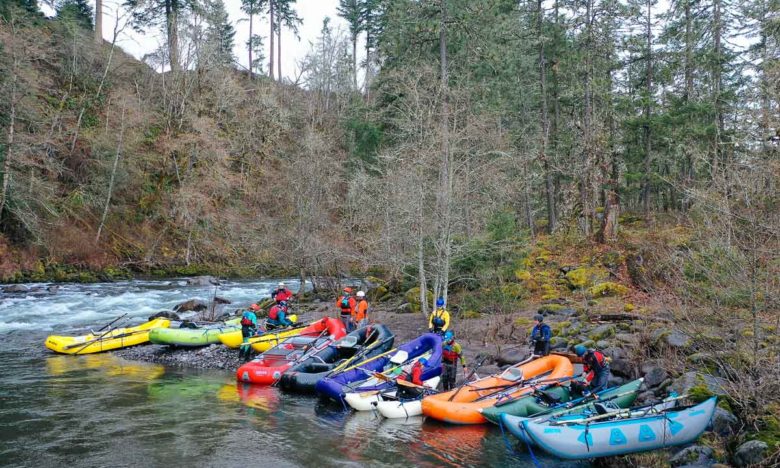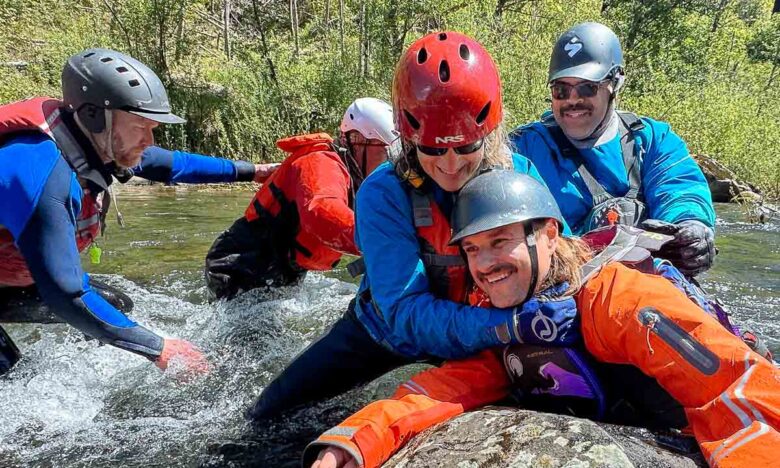Whitewater rafting is a sport that has changed my life, so I am particularly interested in helping others work on their whitewater skills in a responsible manner. To facilitate learning, I created a rowing course and curriculum in 2006, which we originally called a “recreational guide school.”
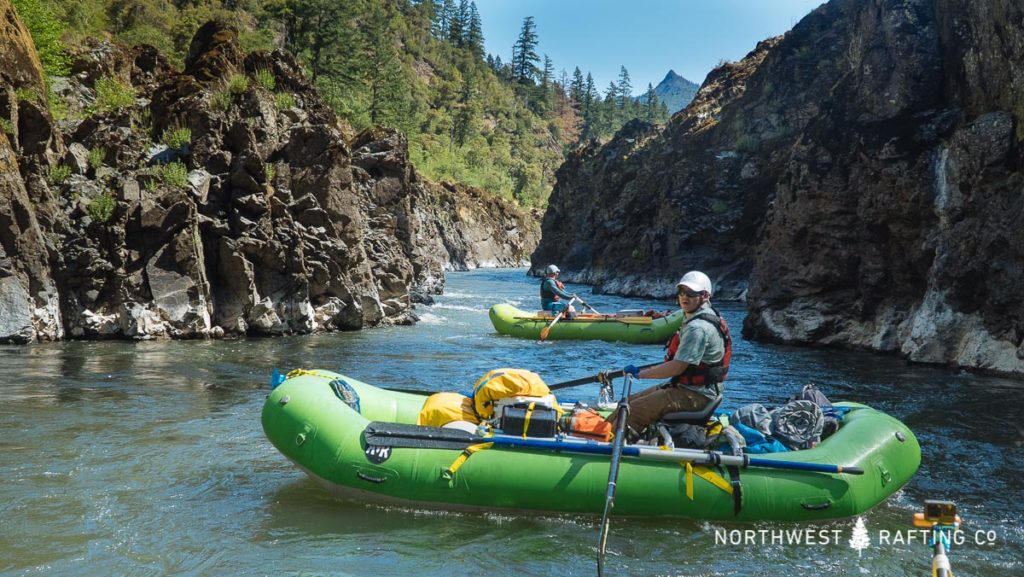
Since then, we’ve learned a ton about how people learn about and improve their whitewater rowing, river safety, and river rescue techniques. The following is a progression to consider while working on your all-around whitewater rafting skills.
First, Learn Basic River Safety
Before getting on the river, there is some fundamental knowledge about safety that whitewater rafters should be familiar with. This includes things such as what to wear and what river obstacles to avoid.
Here are some suggestions for learning about basic river safety:
- Enroll in our Class III Rowing School.
- Enroll in our online rowing school.
- Read books like The Complete Whitewater Rafter by Jeff Bennett.
- Join a whitewater club or meet friends who are willing to share their knowledge.
Next, Learn Rowing Mechanics and Get Some Practice
Most people can get into an oar raft and figure it out pretty quickly; others, however, need some direction on body mechanics. With some time spent on moving water in a supportive environment, you’ll get more comfortable. You’ll soon want to start working on catching eddies and ferrying back and forth across the river.
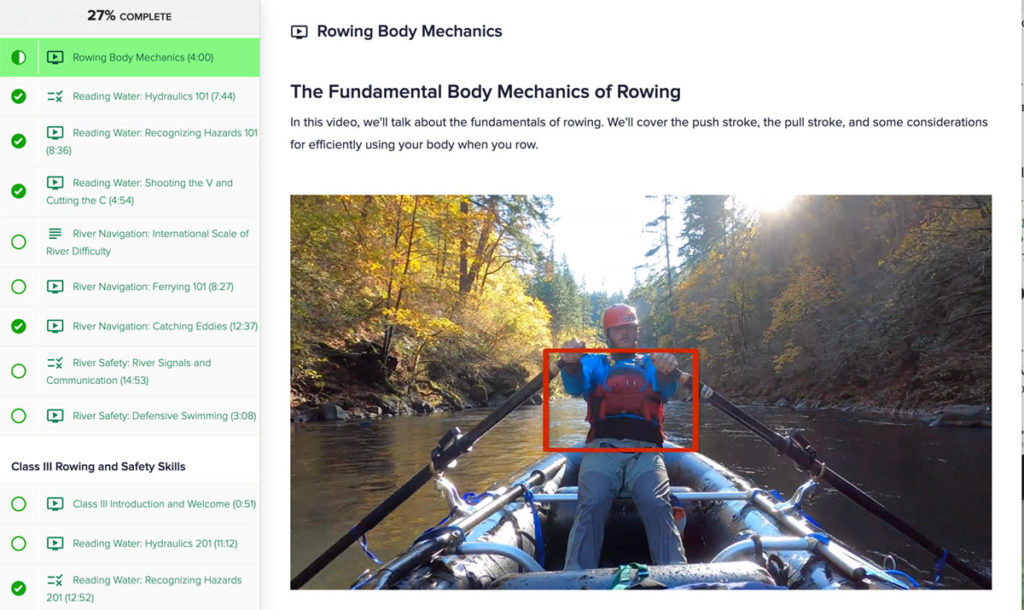
Here are some suggestions for learning rowing mechanics and getting some practice:
- Our Class III Rowing School provides an opportunity to learn the basics and practice in a supportive environment.
- Learn the fundamentals in our online rowing school, and then go out and practice on your own.
- Go out and practice on calm water, and learn through trial and error.
Along the Way, Increase Your Knowledge of River Safety and First Aid/CPR
There is a lot more to learn about safety on a river, like communication, river signals, good boat spacing, safety equipment, and river hydrology. If an accident were to happen on a river—especially in a wilderness environment—you’d want to have some first aid training. CPR is particularly important since drowning can occur in rivers.
Here are some suggestions to learn more about first aid and CPR:
- River safety is covered in both our Class III and Class IV rowing schools.
- Our online rowing course has many lectures and video examples of river safety fundamentals, which are more thorough and comprehensive than what is taught in our courses.
- Subscribe to the Gear Garage YouTube channel or other YouTube channels that share river safety discussions on a regular basis.
- Read White Water Safety and Rescue by Franco Ferraro.
- Take a Wilderness First Aid or a Wilderness First Responder course, as well as a CPR course.
Now It’s Time to Go Boating to Acquire Experience
You’re not going to get better unless you get out there and practice. Once you feel comfortable on a particular section of river, take more difficult lines through the rapids, catch as many eddies as you can, and challenge yourself with difficult ferries. Once you’ve mastered Class II rapids, you can move up to Class III ones if you have a good crew.
The key here is to find people to boat with who are at your level and/or willing to look out for you. Whitewater rafting is a team sport, so you’ll need to find a team to boat with if you want to advance.
Here are some suggestions for going boating and gaining experience:
- Join a local whitewater club to meet other boaters and attend club events.
- Join a local whitewater Facebook group to meet other paddlers.
- Attend a whitewater festival.
If you want to get into rafting, you’re going to need to get out there and meet some boating friends.
With Some Experience, It’ll Be Time to Learn About Whitewater Rescue and Equipment Retrieval
Once you get some experience, you’ll have the information you need to learn more about rescue. This will be important if you want to look out for others on the river and/or challenge yourself on more difficult rivers. Whitewater rescue refers to helping people in trouble on the river. Equipment retrieval typically involves ropes and mechanical advantage to retrieve boats stuck in the river.
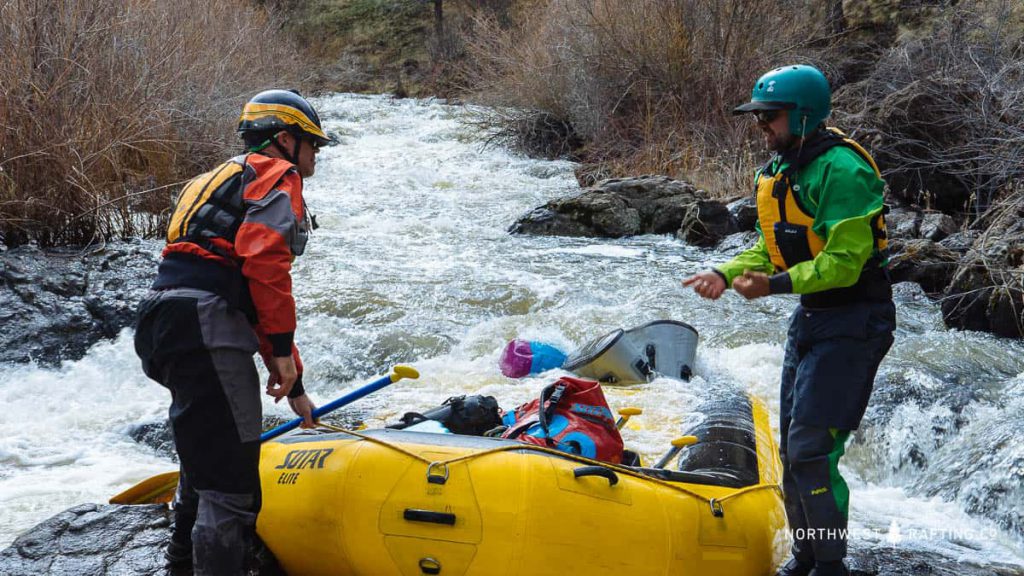
Here are some suggestions to learn more about rescue:
- We cover quite a bit about rescue and equipment retrieval in our Class IV rowing school.
- Our Foundations of Swiftwater Rescue online course has lectures and video examples about whitewater rescue and equipment retrieval.
- Take our swiftwater rescue course designed specifically for whitewater rafters.
Whichever method you choose, you’ll need to continually practice these techniques so that they become second nature.
Finally, Continue Getting on the Water and Keep Training
Once you’ve gained knowledge and developed some basic skills, it’s time to get out there and go boating. Your ongoing training may also come from in-person discussions or from the Internet in places like our Gear Garage YouTube channel.
Please don’t forget to continually train on a few things, including:
- Physical fitness and swimming
- Oar management
- Retrieving swimmers from the water
- Throw bag distance and accuracy
- Flipping your raft
- Knots, anchors, and mechanical advantage systems
After you have developed your own skills, it’ll be time to set a good example and be a mentor for newer boaters.
